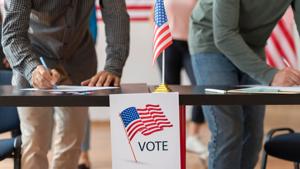The Honest Elections Project says states made significant gains on election integrity laws in 2025.
A new report from the group says eight states banned foreign funding of ballot issue campaigns this year, bringing the national total to nine. Six states also banned ranked-choice voting in 2025, bringing the total to 17.
Honest Elections Project Executive Director Jason Snead said states are responding to threats that undermine voter confidence.
“In 2025, states across the country took extraordinary steps to ban the foreign funding of ballot issue campaigns and ranked-choice voting, two of the biggest threats to election integrity and voter confidence facing the nation, and they did so in record numbers,” Snead said in a statement. “Meanwhile, liberal election attorney Marc Elias continues to argue that foreign nationals like Swiss billionaire Hansjörg Wyss have a right to influence American elections. Fortunately, he has lost at every turn. While there is still much work to be done in 2026 and beyond, this was a banner year for election integrity.”
Federal law prohibits foreign nationals from donating money to political candidates and PACs. However, many states lack similar protections for ballot measures. The report says the Sixteen Thirty Fund, a liberal funding group, has raised nearly $280 million from Wyss and spent $130 million on ballot measure campaigns in 26 states.
In 2025, Arkansas, Indiana, Kansas, Kentucky, Louisiana, Missouri, Tennessee, and Wyoming enacted bans on foreign funding of ballot issue campaigns. Wyoming was the first state to act this year, and Ohio adopted a similar ban in 2024.
On ranked-choice voting, Arkansas, Iowa, Kansas, North Dakota, West Virginia, and Wyoming all passed prohibitions this year. The report says that means 17 states have now outlawed the system since 2022.
The report notes that Republican trifecta states have enacted 405 election-related laws in 2025, compared to 224 in 2024.
Elias filed lawsuits against Ohio and Kansas to stop their bans on foreign funding. In both cases, courts upheld the state laws. In June 2025, a federal judge in Kansas rejected his challenge and let the ban stand.
Snead said people across the political spectrum should support Kansas and Ohio.
“This should not be a partisan issue,” he told The Center Square in a telephone interview. “It’s unfortunately become one in large measure because there’s so much money going into progressive groups and the left is addicted to this money and they’re willing to use it to advance their agenda.”
The report says other states could act in 2026. It highlights Michigan, Florida, Nebraska, Alaska, North Carolina, Montana and Arizona as places that have seen foreign-tied spending but have not yet passed bans.
“The clearest first step for a state like Florida to take is to pass a true and complete ban on foreign dark money in the ballot measure process, just what eight other states have done this year,” Snead said.






